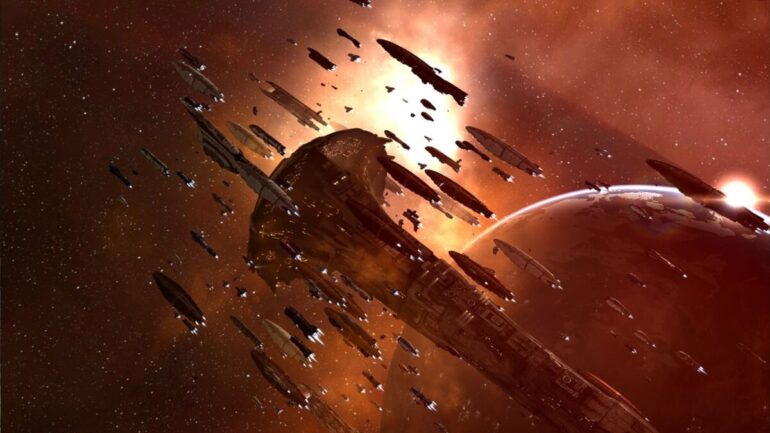EVE Online is a game of numbers. You work through risk assessment, economic advantage, taxes and returns on investment. However, behind the scenes are CCP Games researchers looking to see what about the game is working, and where they should focus their efforts next.
Recently, I got an opportunity to sit down with Josh Rivers, who’s a qualitative data analyst for CCP looking to improve and strengthen the new player experience.
So, what is it that you do?
I’m a player researcher, and what that means is I work to connect the community and player base through qualitative data to our development team. I do UX design as well, so I did a lot of work on Project Discovery COVID-19 project specifically, and I’ve been working with the new player experience over the past year, mostly giving them insights from a research standpoint, telling them what has and hasn’t worked, and so on.
As a qualitative player researcher, where exactly are you compiling this information from? As in, what are the sources for your data?
We use a bunch of different sources. So, we do survey data, we actually bring people in to do useability tests and playtesting. I also look at behavioral data from our behavioral input side of things so we can see what people are doing, how they’re doing it and how often they’re doing it.
I spend a lot of time looking at fancy charts our data analytics team has made about where people drop off in the tutorial, and then I basically take those dropoff points and reach out to new players and try to talk to them about their experience. I try to feel out why the mission didn’t work out for them, or what about this portion was a struggle.
It’s a lot of talking to people and reading people’s responses to surveys, and it’s even some behavioral observation, so I actually sometimes sit in EVE Online just to watch people play the game, as well.
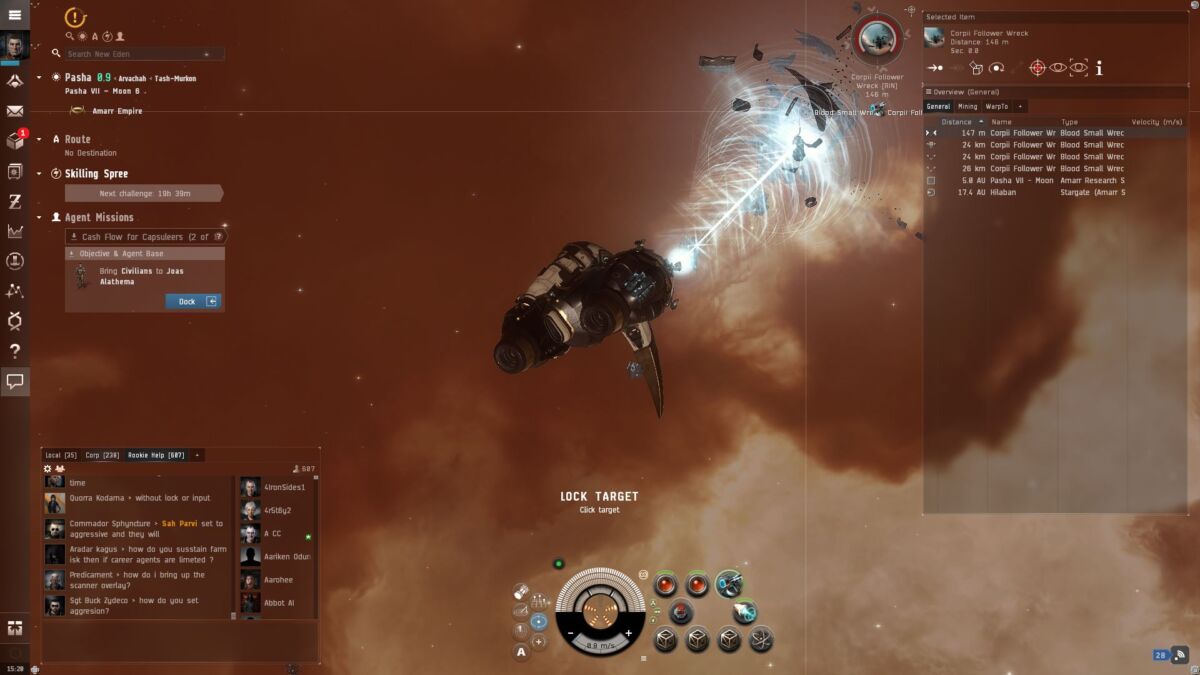
It sounds like you look a lot at the tutorial phase for new players, but do you also analyze the early game for new players. Like, do you see what actions they take just after completing the tutorial?
We haven’t focused on that as much, though we have looked at it a bit. I’ve looked at how people engage with the career agents, which has led to some insights as to how we can make those more useful to new players. I’ve also spent a lot of time talking to people who are in their first week to first month of gameplay to see just what it is they’re doing and how it’s going, and how they’re finding their place in New Eden.
So, the answer here is: not as much as I’ve spent time studying specifically the tutorial part of the new player experience, but still enough that I have pretty deep insight to understand what new players do when they start, or perhaps what it is that they struggle to do.
So are you mostly focused on how to ease the difficulty curve for new players, or are you looking to up the fun of the tutorial, or are you looking to make that portion more captivating? What metric are you looking to most improve?
None of that, actually. The primary metric I work with is player satisfaction. What I’m trying to do is capture moments of satisfaction in the game, and I try to figure out how this user experience makes the user satisfied. Why did they leave this moment happier than before and feeling satisfied with what they’ve done?
When you look at games, especially really good ones, there are times when my heart has been absolutely broken in a game. I’m not having fun, I’m very sad, but I’m satisfied with the experience when I’ve left it because it’s made a meaningful impact on my life in some way.
I think a lot about the story aspect of games, as narrative is very important to us. I work really closely with the narrative design team to chart out new player experiences and where we can go from there to create a satisfying experience.
Playing through the tutorial, it primarily focuses on the high-security, safe experience in EVE Online. However, there’s really no information on the low-sec or null-sec living spaces, and I understand there’s a lot to do out there involving pirates and player corporations. Has that ever come up as something to include in the tutorial?
There’s an interesting principle that underlines EVE in general, and this is the idea of player agency at the core of what we do.
When it comes to low-sec and null-sec, those are almost entirely player-controlled. We built systems and the players can utilize them the way they want, so when it comes to teaching people how to live in those spaces, whatever we teach would be outdated in a matter of months.
Especially when it comes to low-sec and null-sec, we really like to have our players teach the new players, and there are a ton of corporations out there who are actively recruiting people to do just that. We tend to leave those areas up to be taught by other players, as you’re going to be joining a player community, and we don’t want to dictate how those communities are run.
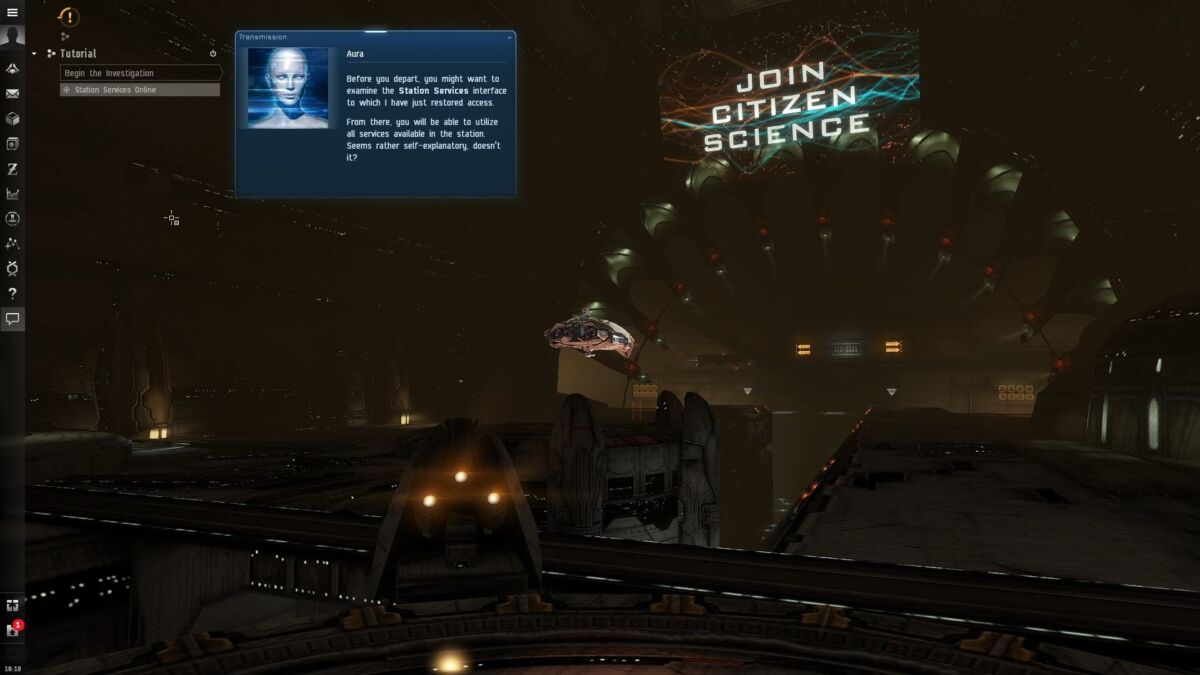
You mentioned the player corporations of EVE Online. What’s the impact of finding a community early on for new player retention rates?
I actually spent a good chunk of time researching this when I first started at CCP. I can’t go into specific numbers, but MMOs in general are like a social space. So when somebody comes into a massively multiplayer online game, they might want to play by themselves, but they’re looking to have a sense of other people playing with them or people playing around them.
In EVE, we have the corporations, which are the equivalent of guilds in other games, and it’s important to find your tribe. That’s kind of how I’ve always described this. It’s not just finding a group, but finding the group that fits what you want to do and what fits your play style.
That hugely impacts retention, of course, but I don’t think that’s new to EVE. I think that it’s true for almost any social game. Finding the people not only makes the game exciting, it really brings life into it.
That said, there is, of course, a group of people who just want to play the game by themselves. So being alone together is a concept we also want to support.
The EVE community, from my own experience, does seem incredibly welcoming to new players when you compare it to other games.
Yeah, people have tended to highlight the backstabs and betrayals after being in a corporation for years, but something that doesn’t get told so often is how welcoming the community is, specifically because they know that new players are the lifeblood of this game.
They’re going to teach you all of the ins and outs so that two months later, they can shoot you out of space and feel good about it, and they know you actually stood a chance to shoot them back.
One of the things I love hearing is when a new pilot will get shot out of space and their attacker will actually reach out and say, “Hey, good fight, here’s what you could do better next time. Here’s how you could fly that ship a bit better.”
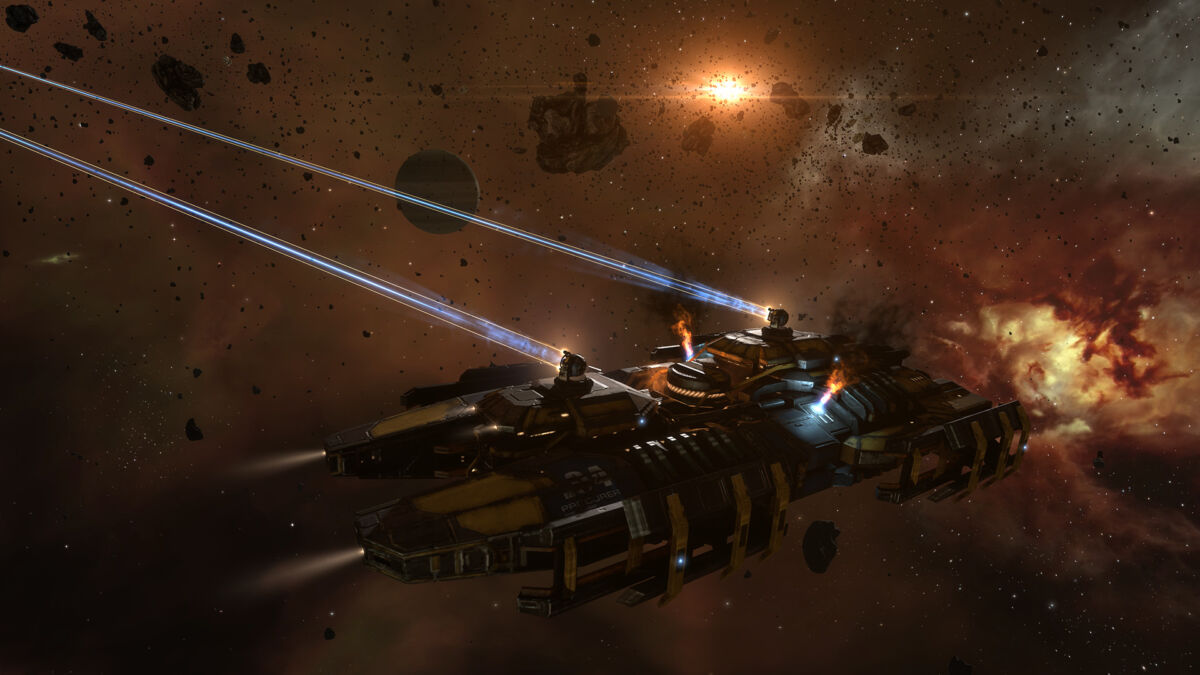
One of my first major experiences in EVE had me basically lose everything I earned when some random player decided to attack me while I was running freight. Have you ever researched the amount of people who give up after their first ship death?
Loss is really important to EVE. Loss is one of the critical dimensions of this game that makes it different from other games, so we absolutely look at that.We look at those moments and see how players react to that experience. Specifically in my research, we brought in players and walked them through their first ship loss.
I look at the emotions that people feel and I connect those emotions to satisfaction and then talk about how the loss of a ship might actually leave you feeling satisfied or unsatisfied. But the number one rule in EVE is: don’t fly what you can’t afford to lose. That’s something we have made very clear, and it’s even included in the career agents.
A lot of games have tried to diminish the impact of loss, like, oh, you haven’t really lost anything after all. And I think we work very differently because if you can lose everything, what you have is so much more valuable, just like in the real world. The wins are that much more elevated when you succeed in making that money.
What advice would you give those people who experience their first ship loss and that don’t have that person who reaches out to help?
So I have two pieces of advice. The first one would be to just get back out there, find a new ship, even if it’s a Corvette, like the one that comes for free from every station, and try your hand at something new. Push forward because eventually you’re going to learn by doing so, and you’re going to learn what mistakes you’ve made.
But the second one, and maybe this is a weird answer, but reach out to the person who shot you. You have a kill report, so you can see who did it. Just reach out and tell them that you are pretty new and you don’t know what you’re doing. Ask for some tips or advice, and nine times out of ten, the person will reach back out immediately and give you that advice and say, hey, here’s what I would have done differently if I were you.
It’s really hard to interpret the numbers on guns and the information that you’re going through with new equipment. Has that come up at all in the new player experience? And is there anything that would help me read that data?
This is kind of the paradox that we face as a game that really wants to be deep in its complexity but accessible to its new players. And this is one of those areas that is really heavily impacted by that, because the beauty of our fitting system is that you can tinker with it for seven, eight years and still not find quite the perfect fit for what you want to fly in the way you want to fly it.
My actual advice here would be don’t care too terribly much about those numbers. Like, don’t put the wrong thing in the wrong slot, try to make sure you’re fitting what makes the most sense for your ship, but don’t worry about the specific percentages until you’re a little bit further into the experience. Ultimately, you’re really working on very thin margins for most of that.
It’s just a matter of figuring out what kind of place you want to engage in. So, for example, if you want to shoot things from really far, that’s a certain kind of weapon. If you want to shoot things from up close, that’s a different type you should use. And we’re definitely working on teaching our new players a little bit better so that they can better understand which weapons work for which range of combat.
But my biggest piece of advice would be to not worry about the small stuff. You don’t start off playing a new RPG by finding the best weapon in the game to go for right away. You find stuff that gets the job done and fits how you want to play the game.
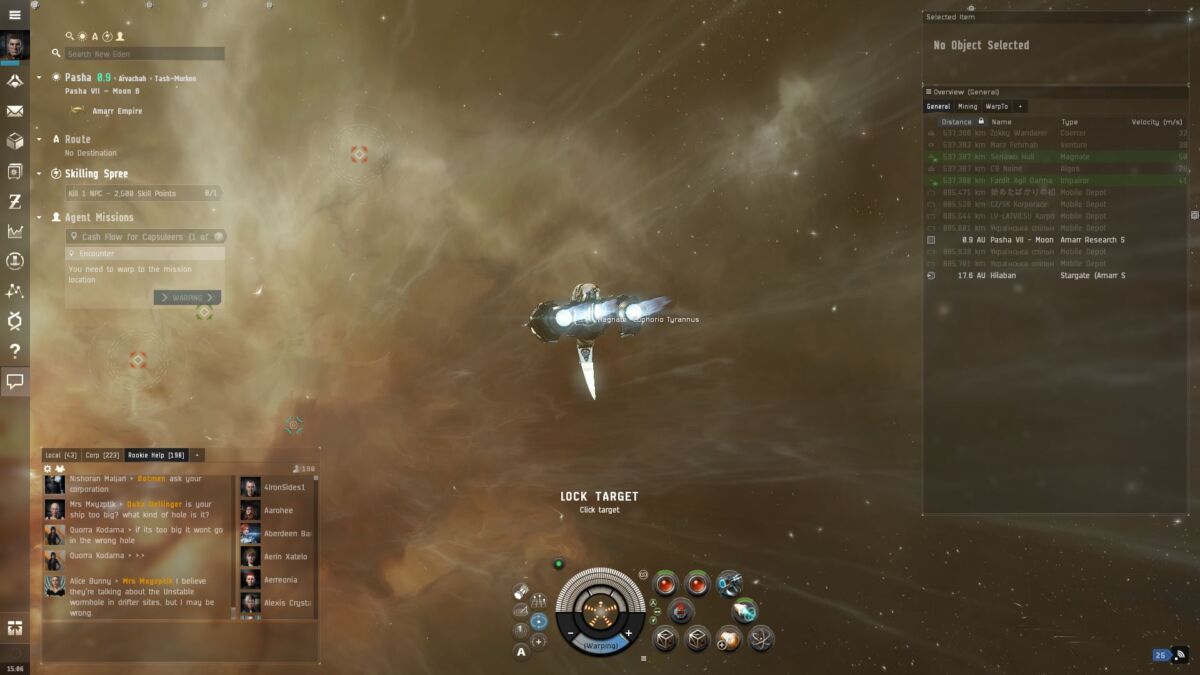
What about the factions? Have you noticed any trends regarding which tends to be the most popular or why people select one over the other?
There are certainly trends to the factions, but it depends on so many different variables. I don’t want to dive too deep into that because I think if I say anything, then that’s going to impact choices and I’d like to not do that. I will say that it just depends on what you’re looking for from your sci-fi experience.
We designed these different factions so that they deliver different stories and that they have different narratives behind them. They’re not going to impact your gameplay, but it’s going to impact where you’re coming from in a narrative perspective and from a law perspective. It’s really important to us that connect you with the empire you start with.
How do the factions differ in that narrative sense? Like, what are the narrative tropes that they fit into?
So these four empires are basically the survivors of the collapse of a wormhole between the Milky Way galaxy and New Eden. From that collapse, the Caldari are this megacorporation-driven society. So they’ve got the corporations more or less running the show, whereas the Gallente tend to focus really into hyper democratic ideals and what that means — less corporate led and way more leaning into democratic institutions.
The Minmatar tend to be based in tribes just by virtue of the way that their society is structured. A lot of their ideals are about freedom fighting. It’s about fighting back against this other empire that has oppressed them for so long. The Amarr tend to be a theocratic led, massive empire, hell-bent on proving that they’re the only ones who deserve to exist within the galaxy to a certain extent and showing why that might be the case.
READ NEXT: CCP Games Talk Starting Out In EVE Online
Some of the coverage you find on Cultured Vultures contains affiliate links, which provide us with small commissions based on purchases made from visiting our site. We cover gaming news, movie reviews, wrestling and much more.


